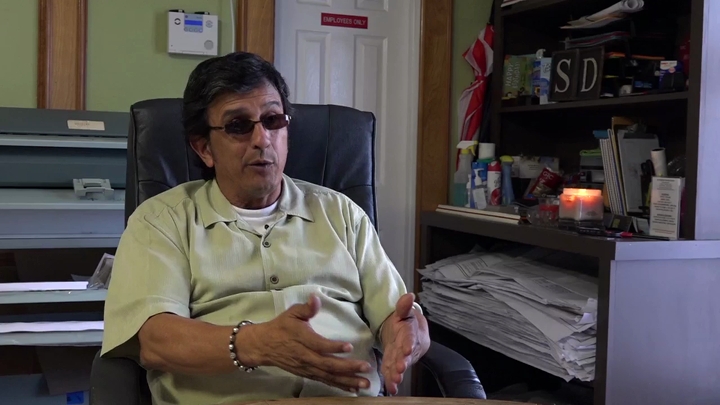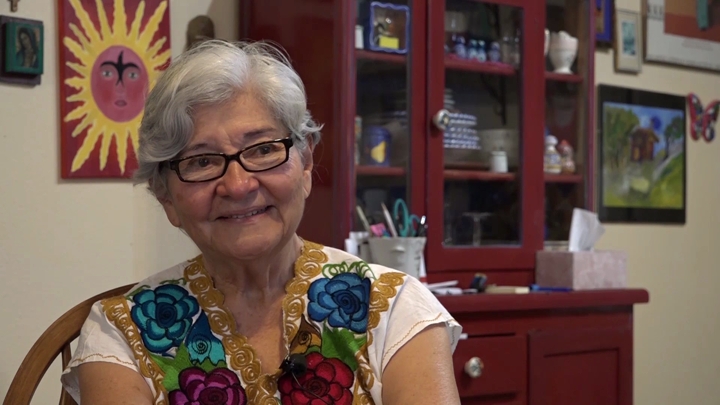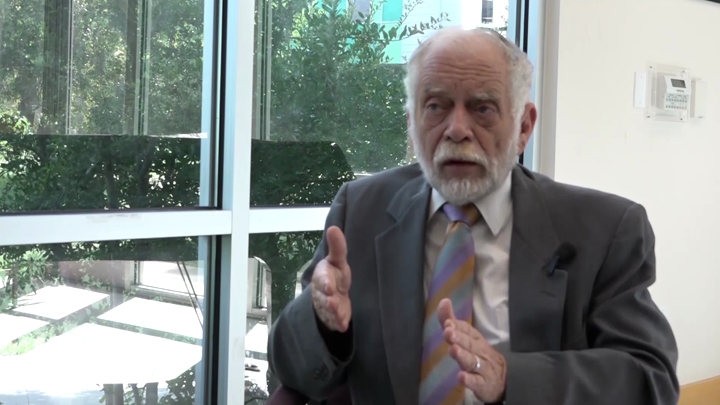Harrington / South Texas
sign up or sign in to add/edit transcript
Arionus : Would you say that in the north instead of de jure segregation that you had de facto segregation? Harrington : Sure you had de facto segregation. There was no doubt about that, but it wasn’t as intense. I mean we have de facto segregation in Austin and we had until about three years ago when the yuppies to cover the east side or whatever they are called these days. When they took over the East side. We still have de facto segregation. It is really hard, I don’t know what it’s like with a very young generation the millennials but I think it hasn’t changed. You can go to a party and be surprised if you look around at the lack of diversity. It is really stunning. And when I came to Austin of course I was the progressive City. Or that cause it self and I would go to these parties and say wow aren’t we 40% minority at this point. Where are the people. And it still much like that so you have de facto segregation everywhere. I think in the north it was not as rigid. There was more crossover it was more acceptable. Michigan universities and colleges were among the first to really develop affirmative action and bring people. One of the first things I did when dealing with my grandson was to get two kids, two brothers into Michigan State because Michigan State wanted to attract these people. One went on to become general counsel for UAW. The other one dropped out. Arionus : Could you talk more about how you helped bring me to Jerome and answer Michigan State? Harrington : The statute of limitations has run, so I can tell you about this that was not quite kosher. Michigan State had opened up this caller ships and I became aware of them. I had a friend who helped do that, Ruben Alfaro. So, when I went down at the beginning of the season to southwest Michigan I went over to a camp right across the border in Indiana. That is where I met these two guys. They were from Lubbock. They were in high school they had just graduated and we’re really sharp. They want from Lubbock, they were actually from Austin. Their dad ran a barbershop. But they were migrating and so you had to be a resident of Michigan to qualify for the migrants, are you had to be living in Michigan to qualify for the migrant scholarship. So I use the address where we were housed in Niles Michigan to get them into Michigan State. Arionus : Going back to South Texas, can you tell me if you were in McAllen at this time? Is that where you were located? Where in South Texas are you located? Harrington : We were living in Pharr. The office was in between Alamo and San Juan. It had just been built by farmworkers. The original office had been in McAllen. In fact, when I went down there for the interview it was in McAllen. When I move there a few months later they had built a cinderblock building and the church had donated the property. Arionus : Can you describe the community when you first moved there? Harrington : Well it was very poor, just like what you would expect. It was very poor. And the power at that time was still in the hands of the anglos was so you could see the transition was just beginning. In 1966 March to Austin, and after the Rangers suppressed the strike and 67, the Chicano movement began and that was sort of the kick off. Part of that was Raza Unida the political party that organized. That was going on in the valley to you so as part of the political transition is- Anglos still controlled the Democrats party at that time, the establishment. So the Raza Unida was running candidates and stuff but they never one in South Texas. But it was a significant shock to the establishment on the amount of people that actually voted for the Raza Unida party. All of that stuff was going on, there was ferment when there was stuff going on. There had been a Pharr riot earlier, before I got there. There had been a police riots and demonstrations. Or a series of demonstrations against the police. Actually the mayor and the city Council were swept out and a Hispanic slate was elected so stuff was beginning to change. But the poverty was immense, as it still is.
| Interview | Interview with Jim Harrington |
| Subjects | Migration › Migrant Labor |
| Housing › Neighborhoods | |
| Religion › Churches › Church Community and Social Services | |
| Race Relations | |
| Discrimination or Segregation | |
| Education › Secondary Education | |
| Education › Higher Education | |
| Police and Law Enforcement › Texas Rangers | |
| Electoral Politics | |
| Electoral Politics › Raza Unida Party | |
| Historic Periods › Mid-1960s [Exact Date Unknown] | |
| Direct Action | |
| Tags | De facto Segregation |
| Michigan State University | |
| sign up or sign in to add/edit tags | |
| Interview date | 2016-06-13 |
| Interview source | CRBB Summer 2016 |
| Interviewees | Harrington, Jim |
| Locations | Austin, TX |
| McAllen, TX | |
| Pharr, TX | |
| Lansing, MI | |
| Duration | 00:05:49 |
| Citation | "South Texas ," from Jim Harrington oral history interview with , June 13, 2016, Austin, Civil Rights in Black and Brown Interview Database, https://crbb.tcu.edu/clips/5492/south-texas, accessed February 20, 2026 |






